Perception and reality at Reaseheath College
 Most Greenkeepers or Groundsmen who deal with members or players on a regular basis would no doubt agree that 'perception' and 'reality' don't often make agreeable bed fellows.
Most Greenkeepers or Groundsmen who deal with members or players on a regular basis would no doubt agree that 'perception' and 'reality' don't often make agreeable bed fellows.
James Grundy, Head Greenkeeper and Instructor at Reaseheath College, offers an insight into the perception of the modern day student, before handing over to Level 3 Diploma student, Sam Jones, for a splendid reality check!
I am sure that many who have been in industry for some time and, like myself, trained in the 70s, 80s or 90s, think of their own college experience when perceiving a modern day educational system. Perceptions, however, are based on presumptions which are not always reliable.
The reason for writing this follows comments I have received during my time as Reaseheath College's Head Greenkeeper-Instructor. Many people seem to think that college is like it was "back in their day". However, if we are really honest, I am sure such memories are tainted a little by a touch of those good old rose tinted glasses. When it was all turn up and get on with it, armed with a rake in your hand and a kick up the backside. As with anything in life, things constantly change and evolve within and around the society they form a part of. As a result, the reality is that, full time College 2011 style is not quite like those memories.
At the outset, one major point to bear in mind is that colleges are dictated to by the Government and the awarding bodies as to how many Guided Learning Hours a learner, i.e. student, must undertake to complete a given qualification. In other words, how many hours practical or theoretical instruction they can be given in line with the funding. One point to remember is that colleges were privatised back in 1992. As a result, they are private enterprises, and it is a fact of life that every business must balance the books, dot the I's and cross the T's; fundamentally, colleges can only operate within the parameters they are set.
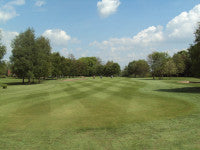
Two other major areas within modern education, that may or may not have been coming to the fore when you attended, play a large part and are worth considering. The first is to the requirement to provide an opportunity for varied learning and experiences in a clearly defined time slot; this is known as enrichment, which can either be time in and around the core subject or time spent outside the core subject, such as participating in team sports or other leisure or curriculum activities.
The second area is in learning support. All learners are assessed in the first six weeks of college and, should they require additional help for dyslexia or other learning problems, then they will be allocated time for specialist support.
On top of this, course managers are also required to provide one hour per week tutorial offering further guidance and support on any college or personal based issues a learner might have.
In addition to the above, the learner is also required to meet a level of competence in Mathematics, English and Information Technology suitable for their course. These are known as Functional Skills. Some of you might remember them as key skills. This is assessed via an array of tests and exercises, as well as using the assignment work they undertake for their main qualification.
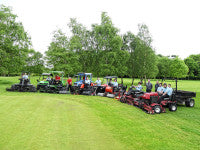
Finally, learners are offered opportunities to gain additional qualifications in and around the subject area. Some are mandatory and some are optional. They might include such things as; Mower, Strimmer, Spraying, Chainsaw and Tractor Driving qualifications to First Aid, Manual Handling and Health and Safety.
The purpose of all these areas of assessment is to provide every learner with an equal opportunity to excel and grow as a person, as well as within their specialist field of study. The overall aim of this is to give them the best possible chance of being successful in their future careers.
Clearly, that's not a kick up the backside and a get on with it approach! Within this overall picture, it is not always possible to provide an opportunity for an intensity of repeated practical experience within the base curriculum. However, at Reaseheath, we engage with employers throughout the industry and appreciate that, ultimately, what is required is someone who can do a job. As a result, we employ various methods to help and encourage our learners to experience as wide a range of practical experience as we can.
The learners are required to complete 300 hours work placement in their first year, some of which is undertaken in a four week block around Easter. This is preferably done outside of the comfort of the college environment, where they can get a real flavour of industry. Many learners will further this experience by working for these providers throughout the summer, or on their days away from college.
Within Reaseheath, the horticultural department employs a compulsory enrichment period for half a day, where students from all groups rotate around the different disciplines on a rota. This helps to widen the knowledge base outside of their immediate specialism, as well as providing an opportunity to underpin what they are learning during lectures.
In the second year of the level 3 course a weekly duty rota is implemented, whereby the learners can either work at a placement of their choosing, as long as it is linked to their area of study; often this is the location of their initial work experience placement. Alternatively, they work on the college course one week and then at Portal Premier Golf Club the next, where Head Greenkeeper, Justin Lee, and his team play their part in providing industry experience.
On top of this, my experienced assistant, Simon Hewitt, and I operate an open door policy. All learners know that, at any time they wish, they are free to come down and ask if there is anything for them to do. The one caveat they are told from the outset is we can't always promise it will be exciting, especially at first, but the more effort they put in, the more they will be rewarded with greater responsibility and range of tasks.
Tying this experience all together is the Reaseheath Open - Vintage Day, our annual charity golf competition aimed at attracting players aged over seventy.
The Open was originally started by Dennis Mortram for the HND course back in 1993. Over the years, elements of its organisation change, but the core principle remains. It is an opportunity for final year students to put into practice all that they have learned during their time as a Reaseheath student.
The one major change of the last few years is that, originall, it was organised as part of an assessment within a single course and all the students were drawn from this. The competition is now stand alone and, as such, draws students from a range of courses who all put the effort in voluntarily. This means that the final year learners not only have the responsibility of organising the competition, but also supervising and managing younger or less experienced ones.
The final year learners in question are from the second year of the Level 3 Diploma in Sports Turf Construction and Maintenance. This course, which comprises units such as Plant and Soil Science, Machinery and Mechanics, Turf Construction and Maintenance, Business Management and others, is equivalent to three A-levels.
At this point I'll let Year 2 Student, Samuel Jones, the 18th Reaseheath Open - Vintage Day 2011 Project Manager, relate his journey.
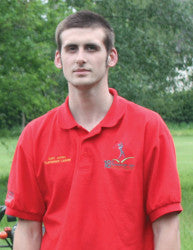 In the Beginning
In the Beginning
From a young age, I have been interested in the horticultural industry; this interest has never changed through the years. From leaving high school, I took the opportunity to start my studies in the sector and achieved my Level 2 National Certificate in Horticulture. During this time, I took the opportunity to gain further experience by working with a grounds team, which then evolved into work on a small golf course. It was this initial experience that inspired me to want to become a greenkeeper.
In September 2009, I enrolled at Reaseheath College in Cheshire to start my Level 3 National Diploma in Horticulture. This course covered a range of horticultural disciplines, giving me a further grounding and appreciation for other areas, which is important for a greenkeeper due to the diverse range of responsibilities. However, the course also allowed me to take an option to specialise in Sports Turf. This course opened my eye into what the work of a greenkeeper or sports groundsman would be like, and the range of jobs involved, whether good or bad.
With the help of the Head Greenkeeper, James Grundy, and Assistant Greenkeeper, Simon Hewitt, as well as my Lecturer, Chard Spicer during the first year of studying, I learned many of the duties that needed to be undertaken by a greenkeeper/groundsperson whilst working on the college's nine hole private golf course and sports pitches. Whenever I was free from study, I would devote my time to working with James and Simon, helping out in an effort to gain more valuable experience. During my first year on my course a Charity Golf Tournament was announced, the 17th Vintage Open, which was to be held in May.
Around February 2010, the project manager, Iestyn John, came to see my group asking for volunteers to help out. Seeing this as another opportunity to gain more experience, I was keen to be involved and signed up.
After attending update meetings in the weeks prior to the tournament, I started to realise how much work was going to have to be put in, and how long the days were
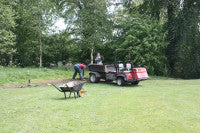 going to be to achieve the standard which was required. Over that week I learnt more about the way a tournament standard course needed to be prepared. The realisation of the commitment required fully hit home when, the night before the competition, having been out on the course since 8.00am, we were still working at 9.30 in the evening, with the aim of being back up and out again at 5.30am the following day.
going to be to achieve the standard which was required. Over that week I learnt more about the way a tournament standard course needed to be prepared. The realisation of the commitment required fully hit home when, the night before the competition, having been out on the course since 8.00am, we were still working at 9.30 in the evening, with the aim of being back up and out again at 5.30am the following day.
However, all the effort paid off and the 2010 Open went really well, raising money for Help for Heroes.
Even after all the effort and the realisation of the commitment required, come rain or shine, I still aspired to achieve what I had always wanted to become, and went away for the summer looking forward to coming back to Reaseheath to complete my second year.
September 2010
Within my second year studying at the college, I was learning more and more about the tasks undertaken by greenkeepers and groundsmen all over the world, and how different types of courses and playing surfaces need to be maintained in various ways.
Once again, I devoted as much of my free time helping out around the course as I could, building up my knowledge; something which was always greatly appreciated by James and Simon. Now, as a second year student, they were giving me jobs of greater responsibility and really pushing my boundaries to develop experience in a wider range of operations and machinery.
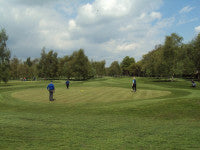 Due to some changes within the college, the role of project manager for the Vintage Open was now a voluntary position, the same as the rest of the team. Responsibility for overseeing the event had also passed onto James, who called a meeting to assemble my classmates and me. James outlined the new system and asked if any of us would be willing to step up. Due to the commitment I had given down on the course, I felt all eyes turn to me. Obviously, the other lads were keen to put me forward! James asked if I would be willing to take up the mantle and be the 2011 project manager. This was something I gladly agreed to do; not necessarily realising the amount of work and pressure I was about to endure!
Due to some changes within the college, the role of project manager for the Vintage Open was now a voluntary position, the same as the rest of the team. Responsibility for overseeing the event had also passed onto James, who called a meeting to assemble my classmates and me. James outlined the new system and asked if any of us would be willing to step up. Due to the commitment I had given down on the course, I felt all eyes turn to me. Obviously, the other lads were keen to put me forward! James asked if I would be willing to take up the mantle and be the 2011 project manager. This was something I gladly agreed to do; not necessarily realising the amount of work and pressure I was about to endure!
James didn't quite leave it all to me though, and he soon set up an organising committee comprising some of my course mates - Rob Aked and Max Lawton, who would act as my Team Leaders. A number of year one students were also on board and would be there to gain experience of what it takes to make the event happen, as like me, next year it could be them!
The committee was to meet occasionally, at first, with meetings getting closer together nearer the tournament. However, getting a group of teenage lads to all turn up when required, and to have actually completed what they said they would, whilst also studying for their main qualifications, is not always easy! Soon, meetings were taking place every week to really push on.
One of our main first goals was to choose a charity to raise money for. After some deliberation, we chose Crossroads Care Cheshire East, Manchester and Tameside, who provide respite services for carers and the vulnerable people they care for. We also took the opportunity to rebrand the Vintage open, which now became the 18th Reaseheath Open Vintage Day. This new title allowed an opportunity for development in the future, as well as giving recognition to the original HND students who organised the very first student charity golf tournament back in 1993.
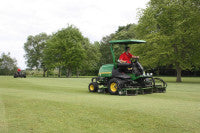 With each passing week, my work towards the tournament mounted up and it was taking up most of my time. We were working with the college's marketing team devising a new tournament logo and contacting local machinery dealers to ask for help and support with equipment. We also set up databases of previous players, local golf clubs and contacts. Other tasks included producing posters, letters and flyers. We also had to source prizes, trophies and food.
With each passing week, my work towards the tournament mounted up and it was taking up most of my time. We were working with the college's marketing team devising a new tournament logo and contacting local machinery dealers to ask for help and support with equipment. We also set up databases of previous players, local golf clubs and contacts. Other tasks included producing posters, letters and flyers. We also had to source prizes, trophies and food.
All in all, when combined with our main college course, part time jobs and private lives, we had our work cut out. James was acting as secretary at the committee meetings and, each week, the number in the "weeks until tournament" spot of his minutes were counting down at an alarming rate.
Quickly, it was March 2011, and the date for the Open was set for Thursday 12th May. The time had now come for me to approach the other horticulture courses to explain what we were doing, and that we were looking for volunteers who wanted to gain experience of working on the golf course and be part of a team, doing something they would remember, for charity.
Before we knew it, the loan equipment we had requested to supplement the college's fleet was beginning to arrive from the local dealers.
This was it, the 18th Reaseheath Open Vintage Day 2011 was now almost here, and the final big push was upon us.
Week of the Open
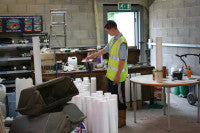 On the week of the tournament, we had fourteen students who were all ready to work under my instruction! The team was a mix of ages and abilities across four different courses, with the youngest lads aged sixteen, and the oldest twenty-three. Even though the process had been honestly explained to them, I'm fairly certain some felt learning and experience just meant sitting on machinery all day. Soon, they discovered that learning takes many forms, one lesson being that, if you have no prior experience or have shown less commitment than others in the run up to the week, then you are going to have to pay your dues and earn your way onto the fairway mower!
On the week of the tournament, we had fourteen students who were all ready to work under my instruction! The team was a mix of ages and abilities across four different courses, with the youngest lads aged sixteen, and the oldest twenty-three. Even though the process had been honestly explained to them, I'm fairly certain some felt learning and experience just meant sitting on machinery all day. Soon, they discovered that learning takes many forms, one lesson being that, if you have no prior experience or have shown less commitment than others in the run up to the week, then you are going to have to pay your dues and earn your way onto the fairway mower!
On the Monday, most people got stuck in weeding the clubhouse borders, whilst fellow committee members and year one students, Seb Tame and Chris Lyon, worked with classmate Jack Heath painting all the new marker posts that were due to go out on the course. For the Tuesday and Wednesday, the course is closed to members to allow preparation for the tournament but, on Monday the usual midweek members competition still takes place. In truth, we fell behind schedule a bit on that first day, but were still determined to achieve all that we set out to. Tuesday saw plenty of mowing, as well as some more marker post painting. The border weeding, however, was now replaced with path weeding; still a long way from that fairway mower!
Work also continued on a new path from the first green to the second tee. The edging boards went in, as well as the levelling work being undertaken. Day two left us working late into the evening, with an 8.30pm finish.

Wednesday was the final day, so it was all hands to the pump. Paths were topped up and the whole course was cut, with tees and greens being double hand mown. Tees were also divoted and bunkers edged. The hover mowing, strimming and other final little jobs, that make the big difference, also all got completed.
Many of the team travel to and from college by bus so, by 5.00pm each night, a core team of seven or eight were left to finish things off. For the last night, James arranges for some moral boosting pizzas to be delivered, before he and Simon hand over the keys to the shed and leave us to take the final steps on our own.
The pressure built up on that Wednesday night, and fatigue set in. With plenty still left to complete, it felt as though it was all starting to fall apart as people were making mistakes left, right and centre. As it got later into the evening, we all started to get tired, which lead to unnecessary arguments as we all knew that, if we didn't finish the large jobs we still had left to do, we wouldn't be ready for the tournament the next day. But, I guess that is all part of the learning experience and, with the preparation days now no more, we kept pushing on, before finally leaving the course at 10.30pm.
Day of the Open
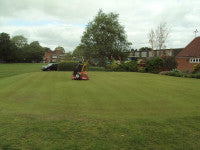 After a very late night, we started work the following day at 5.00am, determined to finish all the jobs we were unable to the night before. I started to think we weren't going to be finished in time, and started to worry that I had failed. The usual course set up details needed seeing to, including greens being rolled with the turf iron.
After a very late night, we started work the following day at 5.00am, determined to finish all the jobs we were unable to the night before. I started to think we weren't going to be finished in time, and started to worry that I had failed. The usual course set up details needed seeing to, including greens being rolled with the turf iron.
Then, as the players started to turn up, the usual meet and greet arrangements and refreshment setup associated with a golf competition also had to be taken care of. Five minutes before the first golfers teed off, the last member of the team left the course. I don't think we could have pushed it any further to the limit than that, but we wanted to get as much done as we could.
Once the players set out, our work was not finished, as we set up the supplementary competitions around the practice area and prepared the club room and BBQ for the refreshments. Once the day's play was over and the BBQ finished, it was then time for me to fight back the nerves and take centre stage as the presentation event was held.
Throughout the day, there was great feedback from all the players about the standard of the course. It was then I realised I had achieved my goal and, I think, so did the rest of the lads. All of them had worked hard that week, with the intention of giving the golfers a really good day and raising as much money as possible for Crossroads Care.
And finally ...
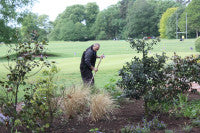 Thanks must go to the players who support both the Reaseheath Open and the charities year after year. Thanks also to the lads who volunteered to get stuck in, and especially the late night crew.
Thanks must go to the players who support both the Reaseheath Open and the charities year after year. Thanks also to the lads who volunteered to get stuck in, and especially the late night crew.
None of this would have been possible without the generous support of the many local companies who helped by donating or sponsoring prizes and equipment. Special mention must go to Turner Groundscare, Campey Turf Care Systems and Cheshire Turf Machinery, who all donated pieces of machinery for that week. Without their continued help, support and commitment the course would not have been at the standard it was, and we would not have had the full opportunity to experience what is required to prepare a course for such an event out in the real world.
Through my previous years of study, I have not learned as much as I have over the past two years here at Reaseheath. I have been given a great opportunity to experience and learn new specialist skills.
As I leave to go out into the world of the Horticulture and Sports Turf industry I know that, if it wasn't for Reaseheath, I wouldn't have the knowledge, experience and confidence to go out and succeed at my ambitions.
James Grundy's Footnote
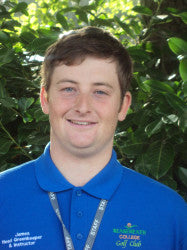 As I sit here writing this in September 2011, Sam has now moved on from the college into the world of employment. He provides an example to the next round of students, as do others before him, that some extra effort, endeavour and willingness to learn can reap its rewards.
As I sit here writing this in September 2011, Sam has now moved on from the college into the world of employment. He provides an example to the next round of students, as do others before him, that some extra effort, endeavour and willingness to learn can reap its rewards.
As Sam mentioned, special thanks must go to all of the kind sponsors of the event who make it possible by providing equipment, prizes and food. A full list of them all, as well as more coverage of the 2011 Reaseheath Open - Vintage Day, can be found at www.reaseheathgolfclub.org
If you would like to contribute towards inspiring the next generation of sports turf professionals, either by offering a placement, or maybe even taking the time to talk to student groups, you can contact Reaseheath College on 01270 625131. Information on available courses and qualifications can simply be found at www.reaseheath.ac.uk.
We also offer a service to talk to all junior members at golf clubs and sporting venues, and offer a presentation on Sports Turf courses that amplify the exciting careers that evolve from such a course of study at Reaseheath.
